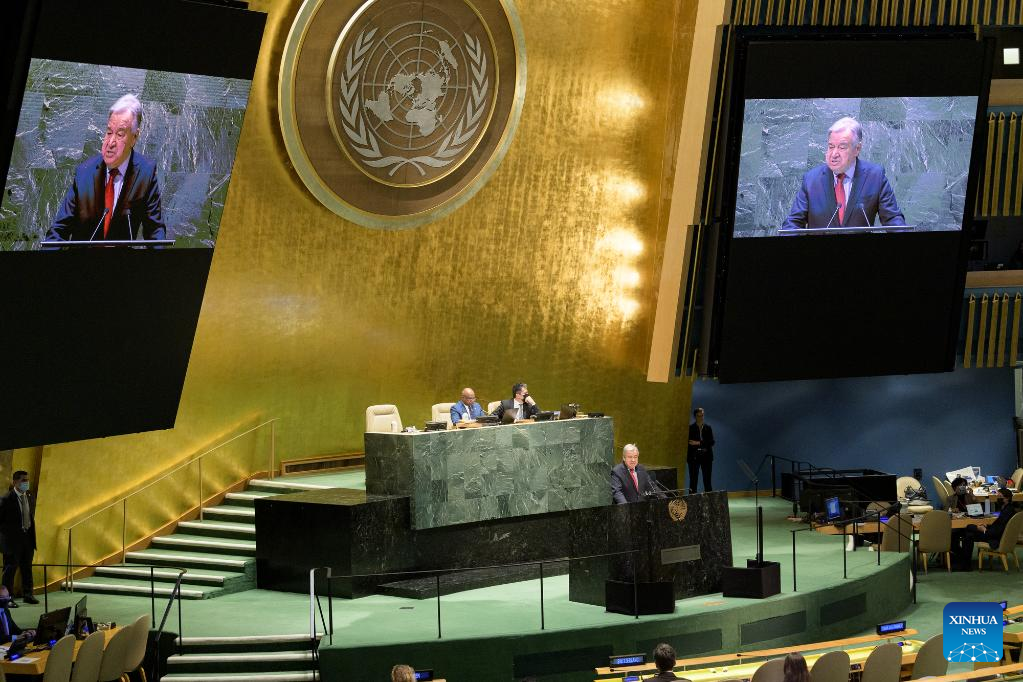UN chief calls for end to slavery's legacy of racism

UN Secretary-General Antonio Guterres speaks at a UN General Assembly commemorative meeting to mark the International Day of Remembrance of the Victims of Slavery and the Transatlantic Slave Trade at the UN Headquarters in New York, on March 29, 2022. Guterres on Tuesday called for an end to the legacy of the transatlantic slave trade: racism. (Manuel Elias/UN Photo/Handout via Xinhua)
UNITED NATIONS, March 29 (Xinhua) -- UN Secretary-General Antonio Guterres on Tuesday calls for an end to the legacy of the transatlantic slave trade: racism.
The transatlantic trade in enslaved Africans was instrumental in shaping modern conceptions of race. To rationalize the inhumanity of the slave trade, Africans were portrayed as less than human, he told a UN General Assembly commemorative meeting to mark the International Day of Remembrance of the Victims of Slavery and the Transatlantic Slave Trade.
Over 200 years since the end of the transatlantic slave trade, the vicious lie of racial supremacy remains alive today. Indeed, it finds new resonance and amplification in online echo chambers of hate, he said.
"Ending slavery's legacy of racism is a global imperative for justice," said Guterres. "This imperative implicates us all. We are all responsible to stand up and speak out in solidarity against racism wherever, whenever we encounter it."
The transatlantic slave trademarked a brutal rupture in African history and has thwarted the continent's development for centuries. At the same time, the prosperity achieved across so much of the Western world was only possible through the exploitation of African slave labor and know-how. It devastated the economies of those it enslaved and enriched the colonizers, he noted.
There is a need to reverse the consequences of generations of exploitation, exclusion and discrimination, including their obvious social and economic dimensions, through reparatory justice frameworks. Outside of Africa, people of African descent are often among the last in line for health care, education, justice and opportunities of all kinds. The African diaspora has enriched societies everywhere. And yet it still confronts marginalization, exclusion, and unconscious bias -- its life still darkened by the long shadow of slavery, he said.
The International Day of Remembrance, which falls on March 25, calls on people around the world to stand united against racism; tackle inequities and inequalities; learn and educate about the past; and build societies based on dignity, respect, justice, and opportunity for all, said Guterres.

UN Secretary-General Antonio Guterres (at podium and on screens) speaks at a UN General Assembly commemorative meeting to mark the International Day of Remembrance of the Victims of Slavery and the Transatlantic Slave Trade at the UN Headquarters in New York, on March 29, 2022. Guterres on Tuesday called for an end to the legacy of the transatlantic slave trade: racism. (Manuel Elias/UN Photo/Handout via Xinhua)
Photos
Related Stories
- Chinese envoy warns of consequences of indiscriminate sanctions over Ukraine conflict
- UN member states urged to elevate pandemic management to highest political leadership
- UN peacekeeping mission helicopter shot down in NE DR Congo
- Ukraine urges UN to demilitarize area near Chernobyl plant
- UN chief calls for strong declaration against use of explosive weapons in populated areas
Copyright © 2022 People's Daily Online. All Rights Reserved.










